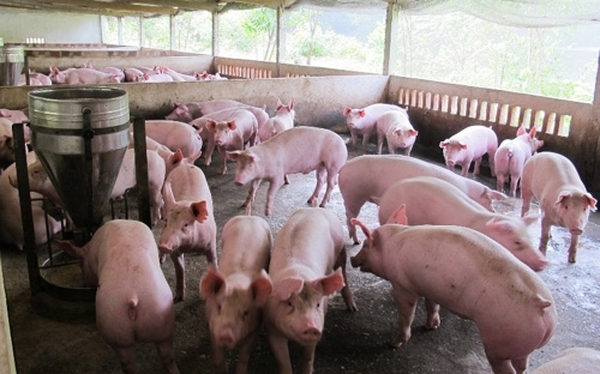In 2018, Vietnam imported $5.3 million worth of pork. Meanwhile, in the first four months of 2019 alone, Vietnam spent $24 million to import pork.

The import price was surprisingly lower than the domestic price, just VND30,000 per kilogram. The exporters are Brazil, the US, Poland, Belgium and the Netherlands.
The mass imports have increased the burden on Vietnamese farmers’ shoulders. They have had to struggle with African swine fever (ASF) which caused sales to drop dramatically, and compete with foreign imports.
Nguyen Van Binh, 56, a farmer in Ba Vi district in Hanoi, said farmers can break even if they sell pigs at VND35,000-37,000 per kilogram.
| The mass imports have increased the burden on Vietnamese farmers’ shoulders. They have had to struggle with African swine fever (ASF) which caused sales to drop dramatically, and compete with foreign imports. |
“With such production cost, farmers find it very difficult to compete with imports,” Binh said.
Pham Thi Lanh, 48, in Thai Binh province, complained that her 500 pigs still cannot be sold.
Meanwhile, she has to spend millions of dong on bran every day.
“Meat processors tend to use import pork and don’t collect meat from farmers,” she explained.
According to Tran Van Chien, chair of Co Dong Service Cooperative in Hanoi, the ASF outbreak decreased the domestic supply, and farmers began sales of pigs too soon, creating a shortage.
Meat processors have also been using cheaper imports.
Chien said the big gap in pork price is the most important cause.
“For businesses, the price gap of VND500-1,000 per kilogram is big enough for them to change business plans. The gap of VND5,000-7,000 is too high,” he said.
Farmers understand that they cannot sell pork in large consignments to enterprises, but only in small quantities to merchants who will sell retail pork in traditional markets.
Brazil, the US, Belgium and the Netherlands can sell pork at low prices because the policies in their countries allow closed supply chains, with big preferences for farmers.
"To help Vietnam’s products become more competitive, the government needs to set up policies to support farmers,” he said.
Nguyen Kim Doan, deputy chair of the Dong Nai Livestock Association, fears that the massive imports will stifle farmers, affecting the domestic livestock industry. He said the government should restrict the import of pork and support domestic farmers by using domestically made meat.
Kim Chi

Agriculture Ministry suggests meat stockpiling to pre-empt pork shortage
Vietnam is seeking solutions to prevent pork supply shortage in the coming time as African swine fever continues to spread.

Pork imports spike, Vietnam's livestock industry under pressure
Vietnam has increased pork imports in the last six months amid the African swine fever epidemic. However, the quality of imports is questionable as Vietnam’s agencies are still weak at quarantine work.
 The amount of pork imported to Vietnam in the first four months of the year was six times higher than that in the entire year of 2018. The import price is VND5,000-7,000 per kilogram lower than the domestic price.
The amount of pork imported to Vietnam in the first four months of the year was six times higher than that in the entire year of 2018. The import price is VND5,000-7,000 per kilogram lower than the domestic price.